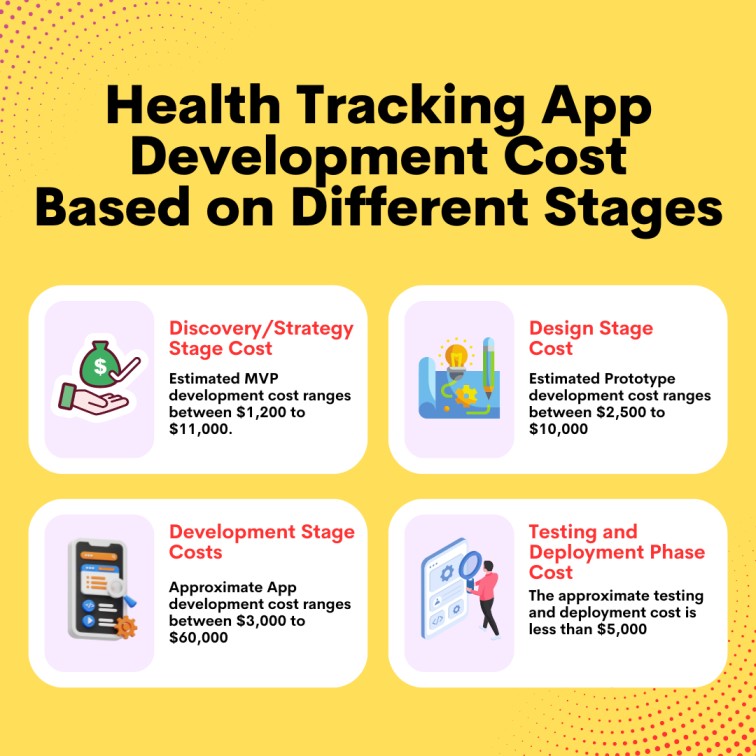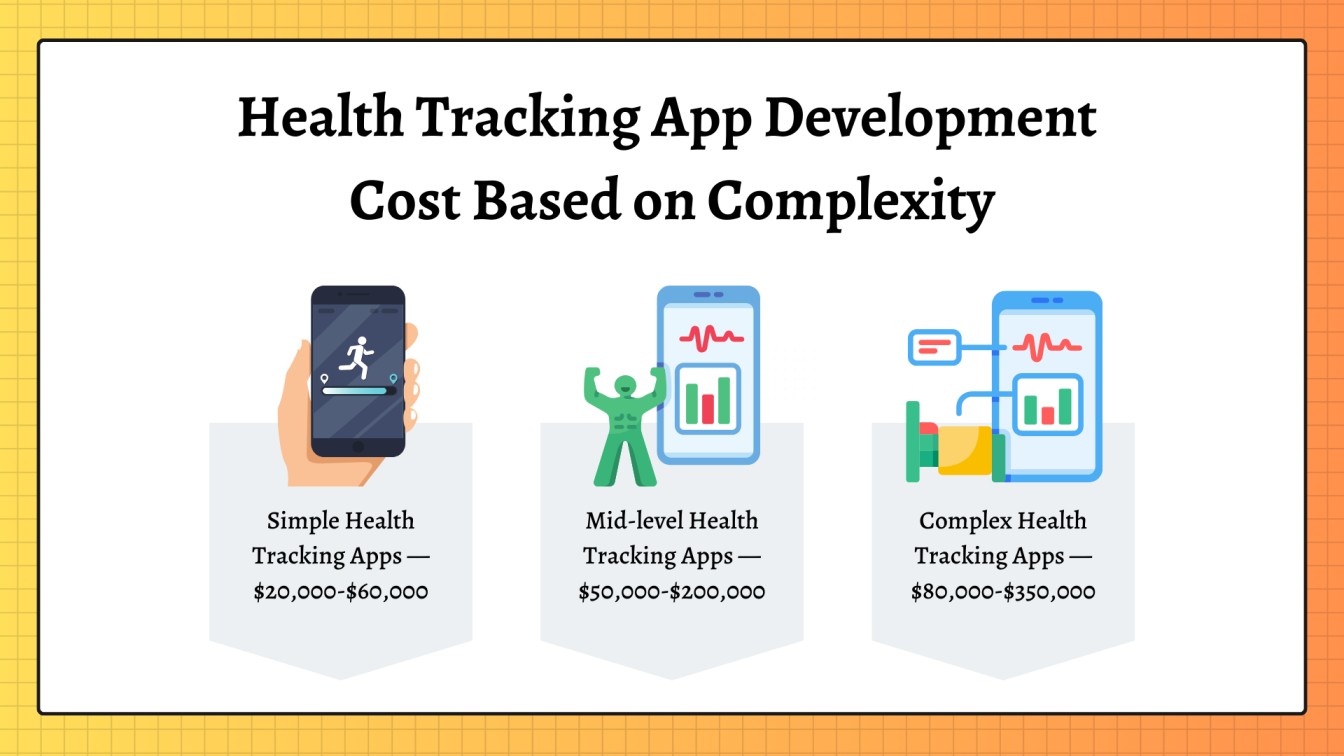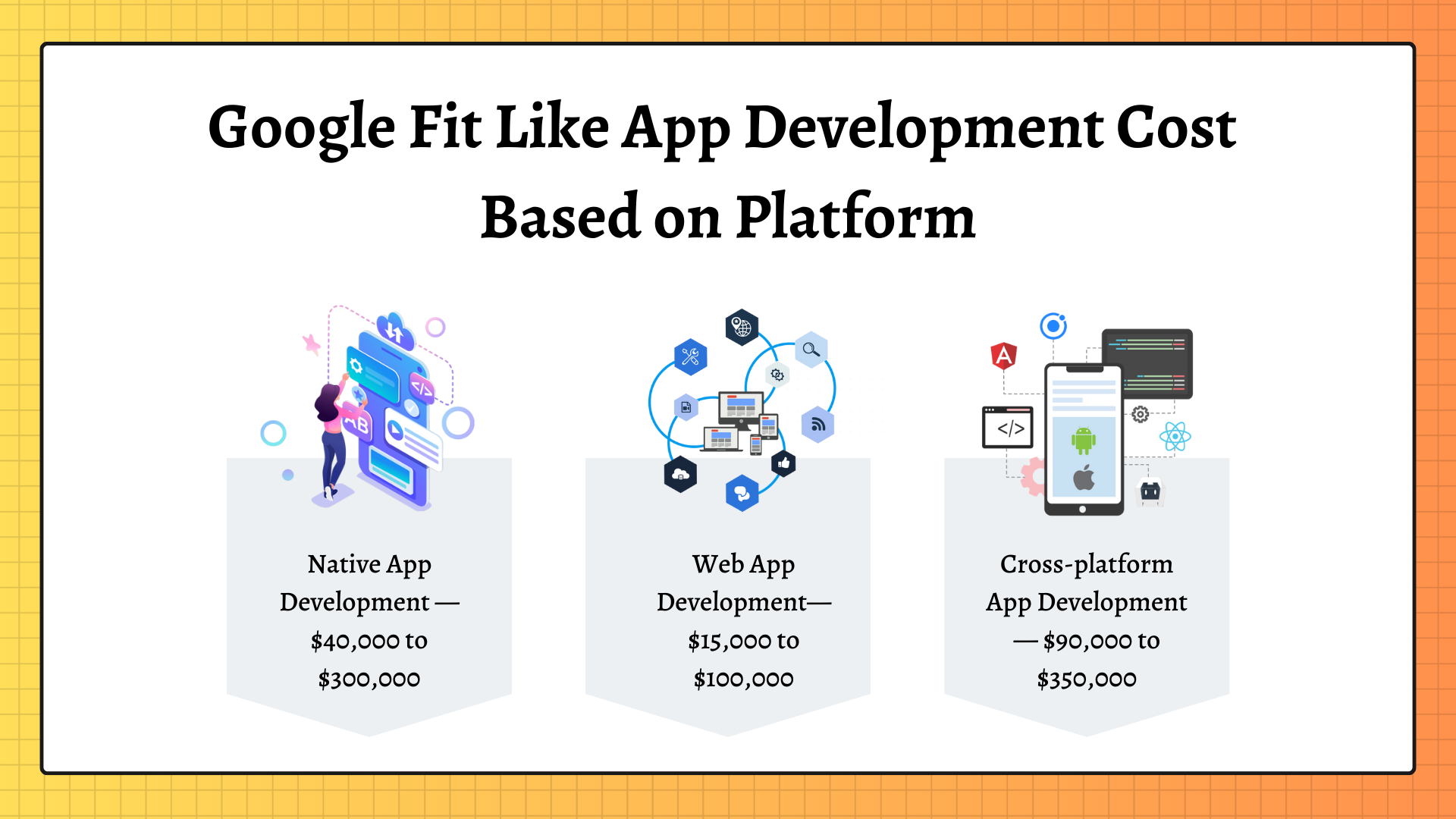The alarming rise in obesity and irregularities in blood pressure, blood sugar, cardiovascular disorders, and anxiety over the past decade is a worldwide health concern. Reducing, or at best handling them, can be specifically hard because of their interaction with and reliability on individual, societal, and environmental aspects such as lifestyle, genetics, food choices, urbanization, etc. It is incredibly essential for individuals to monitor their health smartly. A health tracking app is a new yet highly critical ally aiding the pursuit of a healthy lifestyle.
In today’s digital era, where health and technology converge seamlessly, the demand for health tracking apps like Google Fit is soaring. Whether you are an entrepreneur venturing into the world of mobile health or a fitness enthusiast with a visionary concept, understanding the financial landscape is crucial. You should know how much it costs to transform your idea into a fully functional, user-centric app similar to Google Fit. From dissecting the essential features to unraveling the complexities of budget allocation, a healthcare app development company can help you build intuitive mHealth solutions.
Navigating the Health and Fitness Landscape: Market Insights
Apps for tracking health have been incredibly popular and viable among the general population. These applications track and monitor fitness activities like steps covered, calories burned and consumed, heart rate, distance traveled, amount of sleep taken, and breathing.
To learn more about the health and fitness sector in detail, let’s check the market statistics:
- According to Market Research Future, the fitness app market is predicted to grow from USD 28.3 billion in 2022 to USD 157.9 billion in 2030.
- Between 2022 and 2030, the worldwide fitness industry is expected to increase at a compound annual growth rate of 27.80%.
- 100 million people have downloaded the Google Fit app from the Google Play Store.
Given the global growth of the fitness and healthcare tracking app industry, enormous economic prospects exist. One of the main aspects expected to drive the market is the use of smartphones by patients to enhance their overall health.
Maximizing Your Health Journey with Google Fit
On June 25, 2014, Google Fit was revealed during the Google I/O conference. Fit made its public debut on October 28, 2014. Google Fit is a health-tracking platform created by Google for Wear OS, iOS, and Android. It is a single set of APIs that combines data from various devices and apps. Google Fit records physical fitness activities (walking, cycling, etc.) using sensors in the user’s activity tracker or mobile device. It is evaluated against the user’s fitness objectives to give a complete picture of their health.
Essential Features Provided by Google Fit
- Move Minutes: Every physical activity you engage in, such as walks, runs, swims, and yoga, earns you Move Minutes.
- Heart Points: You can accrue Heart Points by working out. For each minute of sufficiently intense exercise, you receive one Heart Point.
- Customize Coaching guide: Reach your health objectives with personalized guidance and valuable advice based on your health and past activities.
How Much Does a Health Tracking App like Google Fit Cost Based on Different Stages?
The features, technology, design, and location of the health app development team all affect how much an app like Google Fit will cost to build. Here, we’re looking at the breakdown of mobile app development costs for various development phases.

1. Discovery/Strategy Stage Cost
Pre-research, planning, strategy, or discovery all refer to the same things: paperwork, a business plan, and market analysis. Any reputable health tracking app development company will question you about your health & fitness app to understand your concept and vision.
The following details ought to be included in the final document:
- Competitive analysis
- Goal declaration
- MVP idea
- User persona and market research
- A precise project blueprint
The estimated MVP development cost ranges between $1,200 to $11,000, with a 2-4 week timeline.
2. Design Stage Cost
User experience design, visual (UI) design, software prototype, and wireframing are the main focus of the second phase. You must create an exquisite health tracking mobile app that captures the hearts of your target audience since, as we all know, first impressions are crucial. For this reason, you should not skimp on your design budget because it has the power to make or break your project.
The estimated prototype development cost ranges between $2,500 to $10,000, with a 3–4 week timeline.
3. Development Stage Costs
The intricacy of the features determines the approximate cost of health tracker app at this crucial and costly stage of the app development process. The complexity of the features will determine how long it takes to build, which will raise the price.
Moreover, this stage necessitates concentrating on the application architecture, user base, third-party integration, data encryption, storage, etc.
The approximate app development cost ranges between $3,000 to $60,000 (with a 2–6 month timeline)
4. Testing and Deployment Phase Cost
This stage is crucial for health monitoring app costs since you do not have to spend more on post-launch bug fixes. Thanks to the quality assurance team’s thorough testing, your consumers will experience fewer lags, crashes, and problems.
Raise Your Business With Our Digital Solutions
Request Free Consultation
- On-Time Delivery, Every Time
- 90 Days of Free Support
- 100% Money-back Guarantee
- Strict NDA Policy
Furthermore, the cost of testing and deployment is contingent upon the complexity and feature-richness of your health tracking application.
The approximate testing and deployment cost is less than $5,000 (duration: 2–4 weeks)
Cost of Creating a Health Tracking App Similar to Google Fit Based on Complexity
The price of healthcare app development can be significantly influenced by its complexity. Generally speaking, an app’s development expenses will increase with complexity because it will require more time and resources. The following are some ways that complexity may affect the price of developing an app:
- User Interface
- Features
- Platform
- Security
- Integrations
Therefore, to ensure that the cost of creating an app like Google Fit stays within the project budget, it’s crucial to carefully analyze the complexity of an app throughout the planning and design process. The following is how complexity affects cost:

| Complexity | Features | Cost |
| Simple apps | Basic MVP, Standard UI components, Low-tech screens, No storage, Single platform | $20,000 – $60,000 |
| Mid-level apps | Custom UI, High-quality screen, API integrations, GPS access, Data storage, Push notifications | $50,000 – $200,000 |
| Complex apps | Real-time synchronization, Chatbots, Two-factor authentication, Nonlinear workflows | $80,000 – $350,000 |
Google Fit Like App Development Cost Based on Platform
When picking a platform to create a mobile application for your target audience, you should exercise greater caution. Your preferred platform directly impacts the overall cost of developing a health and fitness tracking app like Google Fit. Therefore, you should consider a particular Web App, iOS, Android, or cross-platform. In fact, startups with tight budgets may want to start with a single platform before expanding to multiple platforms.
Let’s calculate the price depending on the app development platforms.

Native App Development: The cost of native apps can range from $40,000 to $300,000, based on the user experience and complexity.
Web App Development: The price range for developing a web application is from $15,000 to $100,000 at the very least. The cost range for creating a more complicated web application is $110,000 to $300,000.
Cross-platform App Development: The price range for developing a cross-platform app is $90,000 to $350,000.
Also Read: Wellness App Development Cost
Health Tracking App Development Cost Based on Development Team Location
Since labor costs range depending on the development team’s location, it might significantly affect the healthcare app development cost. For instance, developers situated in Europe and North America often get better salaries than their Asian and South American counterparts.
Moreover, there might be noteworthy differences in taxes and laws among different countries and areas. Employers may have to pay more taxes, insurance, or perks when hiring developers in some countries, which could raise the total app development cost.
To give you a rough idea, the following table shows how geography impacts the cost of developing health monitoring applications.
| Region | Cost/Hour |
| USA | $30 |
| South America | $50 |
| UK | $100 |
| Western Europe | $80 |
| Eastern Europe | $60 |
| Australian | $90 |
| India | $20 |
How Much Does It Cost to Maintain an App Like Google Fit?
The process of deploying your application on a server is not the end; you still need to keep an eye on it and manage it to ensure it functions appropriately, stays secure, and continues to satisfy customer demands.
The number of dedicated developers, the program’s complexity, the frequency of updates needed, and the size of the technology stack all affect how much it costs to maintain an app.
Annual app maintenance expenses typically run between 15% and 20% of the app’s initial development cost. For instance, if an application costs $100,000 to build, the annual maintenance cost would be around $15,000 to $20,000.
Must-Have Features to Include in Health Tracking Apps like Google Fit
The features of a health & fitness tracking app must be easily accessible by the user, help them navigate the entire app, and provide an interactive interface.
Let’s go through some must-have features of a health & fitness tracking app like Google Fit:
Health and fitness tracking applications like Google Fit are determined by their features, distinguishing how engaging and user-friendly they are. The app should be simple for users to access, facilitate navigation, and offer an interactive user experience.
Let’s see some essential functionalities of a health tracking application:
- Quick Registration
- Track Your Workout
- Heart Rate Tracking
- Food & Water Tracking
- Weight Tracking
- Sleep Tracking
- Reminders
- GPS Tracking
- Goal Setting
- Social media sharing
- Challenges & Rewards
- Connect with any apps
- Personalized Recommendations
- Integration with Other Devices
Enhancing Your Health Tracking App: Innovative Feature To Include
The world of healthcare is seeing a massive transformation thanks to the latest health and fitness app development trends in software development. These trends are not just altering how things function but also transposing the fitness experience.
-
AI-Powered Custom Chatbots
You can access the app’s content in a more dynamic and captivating way using a conversational chatbot driven by artificial intelligence. Hire app developers who specialize in creating AI-based conversational bots, which can be the cherry on the top for your AI software development in healthcare.
-
Deep Analytics Dashboard
User activity within the health and fitness applications and overall browsing trends provide the data. Using custom metrics and analytics reports, these dashboards assist you in better comprehending the data.
-
Blockchain-Backed Payments
Finally, as a leading healthcare application development company, we will assist you in enhancing the security of the payments system on your app by leveraging our extensive and in-depth knowledge of blockchain technology.
Raise Your Business With Our Digital Solutions
Request Free Consultation
- On-Time Delivery, Every Time
- 90 Days of Free Support
- 100% Money-back Guarantee
- Strict NDA Policy
Also Read: Telemedicine App Development Guide
Technology Stack of Health and Fitness Tracking App Like Google Fit
The platform (web, mobile), the programming language used for fitness tracker app development, and the favored testing and deployment tools will all influence the tech stack selection for testing and launching health and fitness apps like Google Fit. Nonetheless, the broad recommendations for a potential tech stack are provided below:
| Components | Web Application | Mobile Application |
| Front-end | Angular React Vue JavaScript HTML5/CSS | React Native Swift (for iOS) Kotlin (for Android) Java (for Android) |
| Back-end | Node.js Django PHP (Laravel is a common option) Ruby on Rails | |
| Database | MySQL MongoDB PostgreSQL Cassandra | PostgreSQL MongoDB MySQL |
| API integration | Google Maps Social media platforms like Facebook and Twitter Payment gateways like Stripe, PayPal, and Braintree | |
| Testing and deployment | Jest Docker Mocha | Firebase Test Lab (for Android) TestFlight (for iOS) UI Automator (for Android) XCTest (for iOS) Appium |
| Cloud services | Amazon Web Services (AWS) Google Cloud Platform (GCP) Microsoft Azure | |
| Analytics | Google Analytics | Firebase Analytics |
Conclusion
Thus, the typical cost of developing an app like Google Fit would be between $25,000 and $200,000, depending on the platform, features, functionality, user base, and program complexity. It can, however, also reach $350,000. Generally speaking, cross-platform app development is less expensive than native iOS and Android app development.
According to Business Apps, the cost of fitness tracker app development with basic functionality can reach $32,000, while the cost of an app with a medium level of complexity can reach $48,000. The initial development cost for a complicated application starts from $72,000.
Over to You
We tried to give you a general idea of the numerous factors affecting health and wellness app development costs. Most importantly, you now have enough sense to estimate the cost required to create respectable software and avoid those cost calculators. Our mobile app development services team can speak with you if you need assistance.
Frequently Asked Questions
Q:1 Is building a health tracking app a good business idea?
A: Yes, building a health tracking application is a good idea, as the market for healthcare apps is skyrocketing, with people becoming more aware of personal well-being and an increasing emphasis on embracing healthier lifestyles.
Q:2 What is the cost of creating a health & fitness tracking app similar to Google Fit?
A: The cost of creating a health & fitness tracking app like Google Fit can range from US $25,000 to US $200,000 or more, depending on the abovementioned factors.
Q:3 How long does it take to build a health tracking app like Google Fit?
A: The time to build a health and fitness tracking app like Google Fit can vary from 3 months to 6 months and even more, as per your business needs and goals.
Q:4 What are the advantages of developing a health tracking app?
A: There are several benefits of making a health and fitness tracking app like Google Fit, which are:
- Convenience and Accessibility
- Data Analytics
- Promising Market Potential
- Marketing Prospects
- Expanded Audience Reach
Q:5 What are the emerging development trends in fitness and healthcare apps?
A: Here are some of the most recent development trends for a health and fitness tracking application similar to Google Fit:
- Integration with fitness wearables
- Incorporating gamification elements
- Facilitating smart home workout solutions
- Integration with telemedicine services
- Utilizing AI and ML technologies



